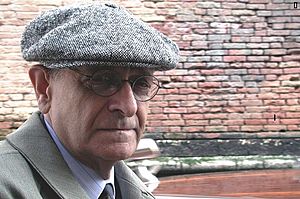Aldo Zargani facts for kids
Aldo Zargani (born August 7, 1933 – died October 18, 2020) was an Italian Jewish writer. He was also a public thinker who lived in Rome. He started writing when he was in his early sixties. His first and most famous book, Per violino solo (which means For Solo Violin), came out in 1995. Besides writing about his own life, Zargani also shared his thoughts on the politics and culture of Italian Jews. He did this through essays, talks, and visits to schools.
Contents
Aldo Zargani's Life Story
Aldo Zargani was born in Turin, Italy, in 1933. When he was five years old, in 1938, the government passed some very unfair laws. These were anti-Jewish laws that changed the lives of all 46,000 Jewish people in Italy.
Jewish people were not allowed to study or teach in public or private schools. They could not marry people who were not Jewish. They were removed from the main political party and from government jobs. They were even taken out of phone books and newspaper death notices.
Aldo's father, Mario, played the viola in the national radio orchestra. He lost his job because of these laws. Aldo and his brother then went to a special school. This school was set up by the Jewish community in Turin just for Jewish children.
Hiding During the War
In 1943, after Italy made a peace agreement with the Allies, German troops took over parts of Italy. Groups like the SS and the Gestapo started arresting Jewish people in every town. Aldo's parents were arrested, but they managed to avoid being sent away. Sadly, other family members were not as lucky. Aldo and his brother hid for a year in a Catholic boarding school.
Life After the War
After World War II ended, Zargani stayed in Turin. He worked as an actor in two theatre companies. This is where he met his wife, Elena Magoja, who was also an actress. His main job was with RAI, the Italian state radio and television company. He worked there first in Turin and then in Rome. He retired in 1994. Aldo had a daughter named Lina and a grandson named Mario. He wrote his book Per violino solo for his grandson.
Zargani believed in left-wing politics in Italy. He was part of a group called Gruppo Martin Buber – Ebrei per la pace (which means Jews for Peace). This group believes that both Israeli and Palestinian people have the right to their own independent countries. Most of his writings talk about how Jewish and non-Jewish people in Italy relate to each other. They also discuss how we remember the Holocaust in history and politics.
Aldo Zargani's Books
Aldo Zargani wrote several books and many articles. Here are some of his main works:
- Per violino solo. La mia infanzia nell'Aldiqua. 1938–1945, published in 1995.
- Certe promesse d'amore. Published in 1997.
- L'Odeur du lac (meaning The Scent of the Lake). This book has three stories not yet published in Italian.
- In bilico (noi gli ebrei e anche gli altri). Published in 2017.
- He also wrote many articles and essays for different magazines and journals.
Famous Books and Awards
Per violino solo has been translated into many languages. These include German, English, Spanish, and French. It won three Italian awards: the Ischia International Journalism Award, Premio Acqui Storia, and Premio Sant'Anna di Stazzema. It was also considered for four other important literary prizes.
Per violino solo and Certe promesse d'amore are both books about Zargani's own life. Per violino solo tells the story of his childhood between 1938 and 1945. It shows his life during the war, a civil war, and the Shoah (another name for the Holocaust). In Certe promesse d'amore, he writes about being a teenager. He explores new ideas, discovers love, and learns to let go of some of his earlier beliefs.
In both books, the stories mostly follow a timeline. But within each chapter, there are many flashbacks (looking back at the past) and "flashforwards" (thinking about the future). Zargani's memories as an older person mix with the views of himself as a child and teenager. He uses what he learned later to understand and judge his past experiences.
In bilico is a collection of twenty short stories and memories from different times in Zargani's life. In this book, he talks about the different sides of Jewish history and identity.
The Role of Humor
In all of Zargani's stories, humor and irony are very important. They help him show the differences between Jewish people as "insiders" and "outsiders." They also highlight personal, cultural, and political disagreements. He uses humor to question simple ideas about what "identity" means. He once said that "only humor and religion survive, while memories fade."


